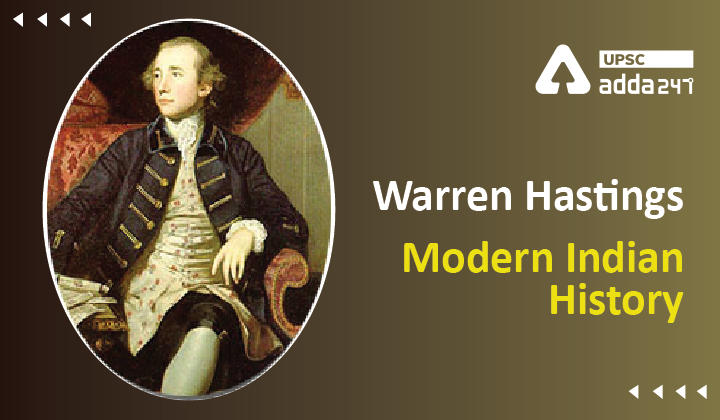Table of Contents
Warren Hastings- Relevance for UPSC Exam
- GS Paper 1: Indian History- Modern Indian history from about the middle of the eighteenth century until the present- significant events, personalities, issues.
Warren Hastings
- Warren Hastings became the first Governor of the Presidency of Bengal in 1772. Later in 1774, Warren Hastings was appointed as the first Governor-General of Bengal.
Professional Journey of Warren Hastings
- 1750: Warren Hastings became a clerk in the East India Company (EIC) at Calcutta.
- 1758: Warren Hastings was installed as the resident of Murshidabad (Capital of Bengal) when Mir Jafar was made the Nawab of Bengal after the Battle of Plassey 1757.
- 1772: Warren Hastings became the first Governor of the Presidency of Bengal in 1772.
- 1774: Warren Hastings was made the first governor-general of Bengal after passing the Regulating Act 1773.
- 1785: Warren Hastings resigned from the office of the Governor-General of Bengal in 1785.
Key Events During Warren Hastings Tenure
- Abolition of Dual System: Hastings abolished the Dual System that had been established by Robert Clive.
- Dual System: Under this system, the East India Company had Diwani rights (rights to collect revenue) and the Nizam or Indian chiefs had the administrative authority.
- Regulating Act of 1773: It was passed by Britain during the tenure of Warren Hastings. Click here to know more.
- First Anglo- Maratha War: It was fought between British EIC and various confederates of Maratha Power.
- First Anglo-Maratha War was fought between 1775-82. To know more click here.
- Second Anglo-Mysore War: It was fought between the forces of Hyder Ali and British EIC to capture power in the south.
- Second Anglo-Mysore War was fought between 1780-84. To know more, click here.
- Abolition of Dastak System: Warren Hastings abolished the system of dastaks prevalent among the employees of the British EIC. Dastaks were misused by company officials and traders earlier.
- Warren Hastings enforced a uniform tariff of 2.5% for Indian and foreign goods along with restricting the private trade by company officials.
Key Reforms during Warren Hastings
- Revenue Reforms
- Board of Revenue: It was set up for revenue collection at Calcutta. British collectors were appointed for each district and an Accountant General was also appointed.
- Calcutta as the Capital of Bengal: Calcutta became Bengal’s capital in 1772 and Treasury was moved from Murshidabad to Calcutta.
- Judicial Reforms
- Abolition of Judicial Powers of the Zamindars: The judicial powers of the Zamindars were abolished in British Indian Territories.
- Establishment of Judicial Machinery: Under Warren Hastings, Civil and criminal courts were established in British India Territories.
- Two appellate courts were established at Calcutta, one for civil (Sadar Diwani Adalat) and one for criminal (Sadar Nizamat Adalat) cases.
- The criminal court was to have an Indian judge.
- Religious Codes for Criminal Offense: Muslims were to be tried according to their law in the Koran scripture.
- Hindus were to be persecuted according to Hindu laws.
- English Translation of Hindu Code: Hindu Pandits prepared a code of Hindu Law that was translated into English.





 TSPSC Group 1 Question Paper 2024, Downl...
TSPSC Group 1 Question Paper 2024, Downl...
 TSPSC Group 1 Answer key 2024 Out, Downl...
TSPSC Group 1 Answer key 2024 Out, Downl...
 UPSC Prelims 2024 Question Paper, Downlo...
UPSC Prelims 2024 Question Paper, Downlo...




